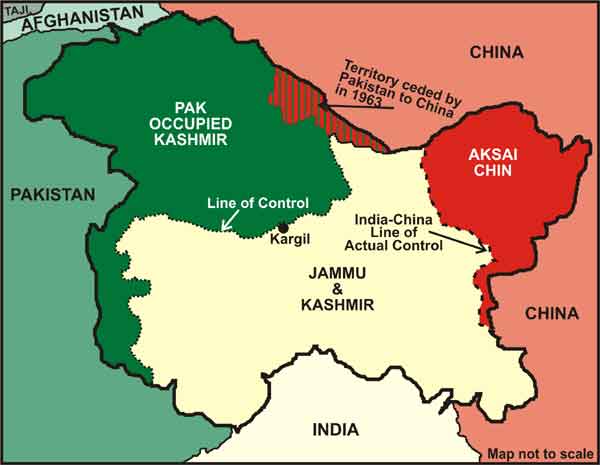Two significant things happened last Tuesday. One, Pakistan Army chief Gen Syed Asim Munir presided over the corps commanders’ conference in Rawalpindi, and two, Pakistan occupied Jammu and Kashmir [PoJK] saw mammoth gatherings of anti-Pakistan protesters taking to the streets in response to a call given by Jammu Kashmir Joint Awami Action Committee [JKAAC].
The press release issued by Pakistan Army’s media wing Inter Services Public Relations [ISPR] mentions that the Pakistan Army’s top brass expressed “concern” over what they alleged were “continued repression of Kashmiris” and “unabated human rights violations by India” in J&K. However, there’s no mention that the alarming situation developing in PoJK was discussed during the conference, which is indeed very surprising.
Since last year, the entire occupied area of J&K [PoJK] including Pak-occupied Gilgit-Baltistan [PoGB] under Pakistan’s illegal possession has been on the boil, and despite Rawalpindi’s brazen use of its infamous strong arm tactics, the situation is only going from bad to worse.
The reality is that contrary to Islamabad’s claim, people of PoJK never accepted Pakistan’s forcible occupation and this isn’t mere speculation but a hard fact. If everything was really hunky dory, then why would Article 7[3] of PoJK’s constitution specifically prohibit individuals and political parties from propagating against, or taking part in “activities prejudicial or detrimental to, the ideology of the State’s accession to Pakistan” [Emphasis added]?
Though not mentioned in the press release, almost everyone agrees that considering its serious implications, the current situation in PoJK would have definitely been discussed during the corps commanders’ conference. However, avoiding mention of the same in the press release by ISPR was intentional as it would invite awkward questions and expose the widespread anti-army sentiments prevailing in PoJK.
Earlier, Islamabad used to conveniently conceal its own monumental failings and abject apathy towards the people of PoJK by claiming that anti-Pakistan protests in this illegally occupied territory were being orchestrated by New Delhi. However, with live issues like denial of basic rights and basic amenities as well as uncontrolled exploitation of natural resources becoming the reason for protests, and the number of participants swelling to several thousands, allegations that only a small group of disgruntled people instigated by India no longer finds any takers.
For example, the protest in Pakistan occupied Gilgit-Baltistan [PoGB] which started in 2023 and is still continuing was triggered by a whopping four-fold unilateral increase in wheat prices from Rs 12 to 36 per kg. Similarly, some other justified demands that have forced people of PoGB to protest are liberal grant of mineral exploration leases to outsiders. Locals are also seeking 80 percent allocation from royalty on profits received by the Diamer Basha Dam project located in GB for development work in the region, an end to the 22 hour power outage, restoration of traditional routes and establishment of medical and engineering colleges in GB.
The story in other parts of PoJK is the same. Jammu Kashmir Liberation Front [PoJK-GB Zone] Dr Toqeer Gilani who’s leading the anti-Pakistan protests is extremely bitter about the way Islamabad is treating PoJK residents as second class citizens. Noting that “The Pakistan administration has been saying that they will always stand with us, and will always fight for the rights of our people” he aptly exposes this hype by adding, “But anyone who is friends with the Pakistani establishment will not need a foe anyway.” [Emphasis added].
Mounting grievances amongst the marginalised people of PoJK has led to the creation of a Joint Awami Action Committee [JAAC] and with this a unified front opposing Pakistan’s ill-treatment of residents in illegally occupied territories of PoJK [including PoGB] has come into being.
This year JAAC decided to break the glass ceiling by boycotting government organised annual sham ‘Kashmir Solidarity Day’ on February 5 and instead observing this day as PoJK“Peoples’ Right Day” to air their genuine grievances. Videos posted on social media confirm a drastic fall in the number of locals attending these events and this must have come as a big setback to the establishment that depends on such orchestrated event to seek legitimacy for its illegal occupation of areas of J&K.
Gilani has convincingly justified boycott of Kashmir Solidarity Day functions by saying, “On the one hand, Pakistan announces to express solidarity with Kashmir on February 5; on the other hand, the same dispensation denies the basic rights to the people under its control.” He has also called Islamabad’s bluff by adding that “we can see that the propaganda of Kashmir [PoJK] is being used rapidly this year in Pakistan to distract attention from the [anti-Pakistan] movement that is going on here.”
That JAAC means business is evident from its announcement of a long march by locals from Bhimber to PoJK capital Muzaffarabad on May 11 to press for rights of the people and ending indiscriminate exploitation of this region’s natural resources. So, rather than tilting at windmills and expressing ‘concern’ on what they imagine is happening in J&K, wouldn’t it be more prudent for Gen Munir and his Generals to read the writing on the wall and seriously start worrying about the way things are unfolding in PoJK?

